Nothing, not even light, can escape the gravitational grasp of black holes, so does this mean black holes will consume everything in the Universe?
Scientists think that supermassive black holes, which have masses between millions and billions times more than the Sun, reside at the heart of almost every galaxy.
But these cosmic monsters are sucking in material relatively slowly, and nobody knows why.
At the current rate, it would take much more than a trillion years – about 100 times the present age of the Universe – for a black hole to absorb all of the matter in the Universe.

Whether or not black holes will ever manage to actually consume everything in the Universe in this timescale depends on what happens to the Universe in the future.
If the expansion of the Universe continues to speed up, then black holes have plenty of time to devour nearly everything, bar some cosmic material that may be pushed beyond their reach by the expansion.

At any rate, even the heaviest supermassive black holes, which weigh in at about 10 billion times the mass of the Sun, will disappear, or ‘evaporate’, after about 10¹ºº years (that’s 1 followed by 100 zeroes!).
If the expansion one day runs out of steam and the Universe re-collapses down to a ‘big crunch’, the Universe’s black holes will all merge.
It is only relatively recently that physicists have managed to simulate the merger of two black holes on a computer.
If two black holes did merge, presumably the result would be one huge, ‘cosmic’ black hole.
